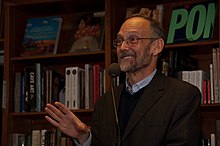Harold McGee
Harold McGee | |
|---|---|
 Harold McGee at a book signing in Washington, D.C., 2010. | |
| Born | Harold James McGee October 3, 1951[5] |
| Nationality | |
| Alma mater | |
| Known for | On Food and Cooking[6][7] |
| Scientific career | |
| Fields | |
| Thesis | Keats and the Progress of Taste (1978) |
| Doctoral advisor | Harold Bloom[1] |
| Website | www |
Harold James McGee is an American author who writes about the chemistry and history of food science, cooking and molecular gastronomy. He is best known for his seminal book On Food and Cooking: The Science and Lore of the Kitchen initially published in 1984[6] and revised in 2004.[8][9][10][11][12]
Education

McGee was educated at the California Institute of Technology (Caltech), initially to study astronomy,[7][13] but graduating with a B.S in Literature in 1973. He went on to do a Ph.D on the romantic poetry of John Keats supervised by Harold Bloom at Yale University, graduating in 1978.[1][12]
Career
Before becoming a food science writer McGee was a literature and writing instructor at Yale. A greatly revised second edition of On Food and Cooking was published in 2004. McGee has also written for Nature,[2][14][15][16][17][18] Health, The New York Times, the World Book Encyclopedia, The Art of Eating, Food & Wine, Fine Cooking, and Physics Today[19] and lectured on kitchen chemistry at cooking schools, universities, The Oxford Symposia on Food and Cookery, the Denver Natural History Museum and the Fermi National Accelerator Laboratory. [citation needed]
McGee also consults for restaurants and manufacturers. Currently, he writes a regular column for the New York Times, The Curious Cook, which examines, and often debunks, conventional kitchen wisdom. Along with Dave Arnold and Nils Norén, he also teaches a three-day class at The French Culinary Institute in New York City entitled the Harold McGee Lecture Series.[20][21][22][23]
Awards and honors
McGee is a visiting scholar at Harvard University.[7] His book On Food and Cooking has won numerous awards and is used widely in food science courses at many universities. McGee's scientific approach to cooking has been embraced and popularized by chefs and authors such as Heston Blumenthal,[4] Alton Brown, Shirley Corriher, Lynne Rossetto Kasper and Russ Parsons.
References
- ^ a b McGee, Harold James (1978). Keats and the Progress of Taste (PhD thesis). Yale University.
- ^ a b McGee, Harold (2011). "Food science: With pipette and ladle". Nature. 480 (7378): 452–453. doi:10.1038/480452a.
- ^ But the Crackling is Superb: An Anthology on Food and Drink by Fellows and Foreign Members of The Royal Society of London ISBN 0-7503-0488-X
- ^ a b BBC Radio 4 Food Programme: A Life through Food with Harold McGee, BBC, 2014-10-13
- ^ "Harold McGee". CooksInfo. Retrieved 22 August 2015.
- ^ a b On Food and Cooking: The Science and Lore of the Kitchen (1984) ISBN 0-684-18132-0
- ^ a b c Harold McGee (Food science writer): On Food and Cooking: The Science and Lore of the Kitchen on YouTube, iBioMagazine
- ^ Food Scientist Harold McGee: 'On Food', NPR December 2004
- ^ Cooking with IEEE Spectrum: Harold McGee
- ^ McGee, Harold J.; Long, Sharon R.; Briggs, Winslow R. (1984). "Why whip egg whites in copper bowls?". Nature. 308 (5960): 667–668. doi:10.1038/308667a0.
- ^ Harold McGee on Twitter
- ^ a b McGee, Harold (2015). "About Harold McGee". Archived from the original on 2014-12-28.
- ^ Cressey, Daniel (2009). "Q&A with Harold McGee: The molecular master chef". Nature. 458 (7239): 707–707. doi:10.1038/458707a.
- ^ McGee, Harold (2013). "Chemistry: A festive ferment". Nature. 504 (7480): 372–374. doi:10.1038/504372a. PMID 24352277.
- ^ McGee, Harold (1999). "Taking stock of new flavours". Nature. 400 (6739): 17–18. doi:10.1038/21775. PMID 10403241.
- ^ McGee, Harold (1998). "In victu veritas". Nature. 392 (6677): 649–650. doi:10.1038/33528. PMID 9565025.
- ^ McGee, Harold (1987). "Trials of the gluttons for punishment". Nature. 326 (6116): 907–908. doi:10.1038/326907a0.
- ^ Mcgee, Harold (1990). "Recipe for safer sauces". Nature. 347 (6295): 717–717. doi:10.1038/347717a0.
- ^ McGee, Harold; McInerney, Jack; Harrus, Alain (1999). "The Virtual Cook: Modeling Heat Transfer in the Kitchen". Physics Today. 52 (11): 30. doi:10.1063/1.882728.
- ^ The Curious Cook: More Kitchen Science and Lore (1990) ISBN 0-865-47452-4,
- ^ On Food and Cooking: The Science and Lore of the Kitchen (2004) ISBN 0-684-80001-2
- ^ Keys to Good Cooking: A Guide to Making the Best of Foods and Recipes (2010) ISBN 0-34-096320-4, a compendium of practical information on food and cooking.
- ^ Modern gastronomy A to Z : a scientific and gastronomic lexicon (2010) ISBN 978-1439812457
